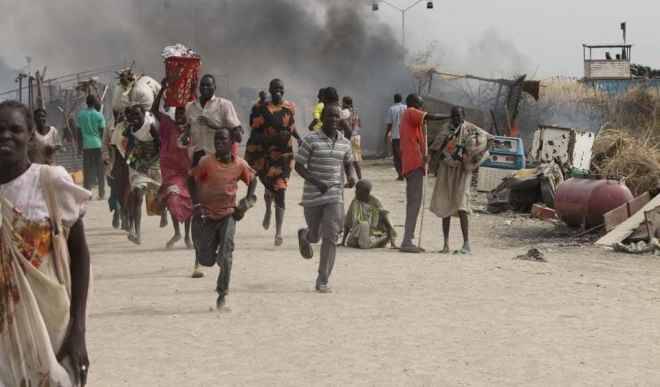About 200 years ago, in 1826, the North was described by the Scottish explorer, Hugh Clapperton, in his memoirs, thus: “a woman can walk alone on foot from Kano to Sokoto without fear of molestation”. This shows the level of peace, tranquility and social justice established under the Sokoto Caliphate. What a turn of events! Today, the same North has become so insecure that even army Generals do not dare to travel by road, and opt for the rail, sometimes in uniform.
The state of insecurity currently devastating the country was bad enough five years ago, when half of Borno State was under the full control of the Boko Haram insurgents (who have since been banished to the Sambisa Forest, Mandara Hills and the Shores of Lake Chad); but it has now become so much worse, and has spread even to those parts of the larger North which had formerly enjoyed comparative peace and safety, with the worst cases in the rural areas.
The rural North is Nigeria’s food basket and is unfortunately facing imminent famine this year directly in consequence of banditry. The North is on a dangerous path of self-destruction. Despite repeated assurances that the army and police are doing their utmost to curb insecurity, the situation continues to deteriorate daily. It is very shocking to see bandits attacking a boarding secondary school in Kankara, Katsina State, and taking away children in a Chibok-attack style, in the very week in which Mr. President was on a private visit to the state.
We must therefore begin to ‘think out of the box’ if a solution is to be found, and found quickly, to put an end to this growing and very dangerous problem. Insurgency, terrorism, banditry, kidnapping, attacking of herdsmen and other acts of criminality could all be related; and we must attack them frontally and quickly, and devise both short and long-term solutions before the country becomes another warlords-governed Somalia. Bin Fodio’s thesis in 1802 titled “Bayan Wujubul Hijrah Alal Ibad” (The Compulsion of Migration on God’s Servants) could have applied in our current situation but for the post-colonial borders. We must, therefore, remain where we are and bring forth solutions from within.
We may find a solution by taking inspiration from Borno State. It was not the army alone that liberated the 17 local governments of Borno State after the 2015 assumption of office of President Buhari; rather, a critical component to that success was the Civilian Joint Task Force (CJTF), formed of rugged hunters from the state who knew the terrain very well. The CJTF led the campaign against Boko Haram with the army giving them backup support and securing liberated areas. The present governor of the state has further increased their numbers and their monthly stipends, as well as instituted a life-insurance scheme to support fallen CJTF heroes’ families. This is the model which every state in the North should adopt!
Formula-100 proposes the recruitment of 100 hunters in each local government (LG) of the North, organising them and providing them with weapons and ammunition. Some among them may prefer the Double Barrel Shot Gun (DBSG) while others may be given rifles, such as the AK-47 and, where necessary, RPG launchers. These recruits should then be given a short training on communications during operations, as well as intelligence gathering. They should be taught the role of GSM and Global Position System (GPS) in locating bandits.
Every hunter will have successfully passed a mandatory screening as part of the recruitment process. The screening will be to ensure the good character of every recruit, and will be conducted at the ward level. It will involve presenting references, testimonies or certificates of good character from reliable persons who may serve as “guarantors” in each community; including respectable heads of families, Imams, and ward or village heads. For long, these traditional institutions have been neglected and in some places the bandits have incorporated them into their criminal networks.
Each LG should have a commander and be given the mandate to clear the bandits in their Local Government Area (LGA). Where there is need for coordinated action across the neighboring LGAs, the commanders can consult together to organise a joint action. This may be necessary in forests such as Dajin Rugu in Katsina State, which covers about 6 LGAs and part of Zamfara State. I am confident that this operation may be accomplished in a matter of weeks or two months at longest.
At the end of the exercise, the CJTF of each state should be absorbed into the army or police, or, better yet, a new security outfit that should be created in each state to assist in effectively fighting crime in a sustainable way. This may serve as foundation for establishing a new State Security Force, which is long overdue. The South had for long been calling for state police and there is really no cogent reason against it. I am sanguine President Buhari will not refuse to approve a constitutional amendment to attain this. The existing objection to it seems to be based upon the fear that in states which are controlled by a different political party, state police may interfere when federal police attempt electoral rigging in favour of the party in control at the federal level. But President Buhari has shown his keenness to end electoral malpractice, and may, in this way, graduate Nigeria to a new level of free and fair elections as we see happening in Ghana.
Budgetary resources to implement Formula-100 may be a chief concern. Let me state clearly that even supplementary budgets can be passed, considering the importance of security; or else the so-called Security Votes can be effectively mobilised. In any case, the funds needed are less than what the federal government intends to spend in creating some few months’ employment for 774,000 Nigerians; and the impact of the Formula-100 will be far greater, as being life-saving for the nation.
The exercise will further add to the security infrastructure of the nation about 40,000 men from the North, and if extended to the South, another 35,000. Presently, Nigeria has only about 150,000 citizens under arms in the Nigerian Army, and about 140,000 in the Police; a number grossly inadequate for a nation of 200 million population. Compare this with Iraq which, under President Saddam, had one million men under arms for a population of about 50 Million.
As soon as the immediate problem of insecurity is addressed, future relapse must be guarded against by long-term plans to create jobs and banish the endemic poverty in the North. This will require reviving the northern industries by providing captive power supplies to industrial clusters through the Gas Master Plan, the AKK Gas Pipeline being a branch of it; and establishing new industries utilising natural gas such as fertilizer, methanol, polymers, etc.
Equally important, our secondary schools and institutions of higher learning must change gear to train students in skills in order that graduates may have hands-on skills to deploy in Nigeria or overseas for gainful employment or even self-employment.
Conventional warfare will never defeat insurgency and banditry, and so our conventional thinking will continue to fail us unless we rise up and do something different to avoid self-extinction in the North. We must think differently, unconventionally and from new perspectives. We must approach our security challenges in new and innovative ways; that’s what this Formula-100 is all about.
Bugaje works with Kaduna Polytechnic.

 Join Daily Trust WhatsApp Community For Quick Access To News and Happenings Around You.
Join Daily Trust WhatsApp Community For Quick Access To News and Happenings Around You.


